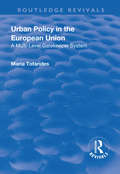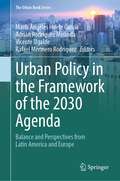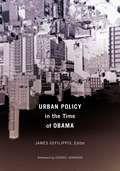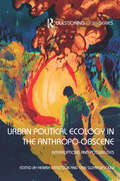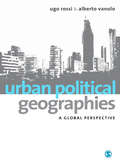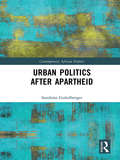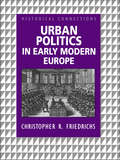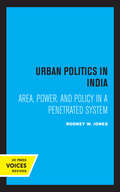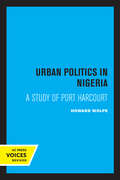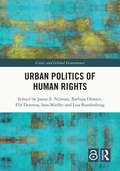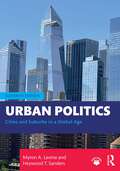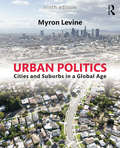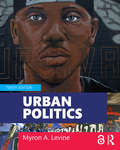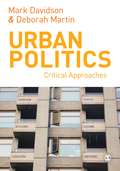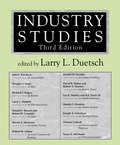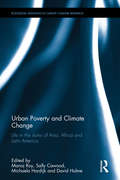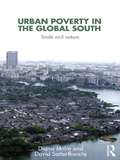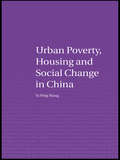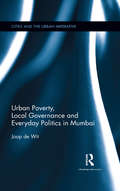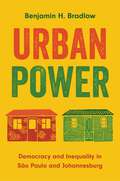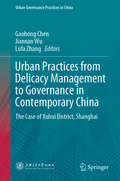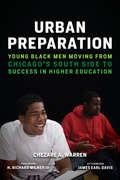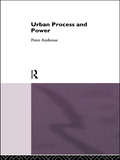- Table View
- List View
Urban Policy in the European Union: A Multi-Level Gatekeeper System
by Maria TofaridesThis title was first published in 2003.This book examines the development of urban policy instruments at the level of the EU primarily by the use of Structural Funds under the European Commission's Directorate-General for Regional Policy. This is the first book-length analysis of the politics of EU urban policy. The first section of the book concentrates on how and why the European Commission, with no clear mandate from the Treaties for an urban policy, has ventured into this area. The second section examines in detail the implementation of one of these instruments in two specific cases: London and Marseilles. This highlights the role of central, and other levels of government, in policy implementation. The comparison between the cases brings important insights into the differences in local political structures and practices in France and the United Kingdom. The book demonstrates in-depth knowledge and analysis of the policy area and relevant theoretical works. This includes a large volume of published and unpublished materials as well as valuable information obtained through a series of interviews. The findings have general implications for relations between the Commission and localities, particularly the difficulties of involving ordinary people in European issues.
Urban Policy in the Framework of the 2030 Agenda: Balance and Perspectives from Latin America and Europe (The Urban Book Series)
by María Ángeles Huete García Adrián Rodríguez Miranda Vicente Ugalde Rafael Merinero RodríguezThe book provides comparative information about the materialization of the 2030 Agenda in urban policy in ten countries located in Europe and Latin America. The Declaration of Quito is the starting point for the implementation of SDGs into public policies in urban areas. However, there are fewer efforts to understand the impact that the 2030 Agenda and, specifically, the instruments developed for its application in cities. The information of each country is presented in relation to two aspects: the construction of a public policy style in each country and the results and impacts on urban public policies implemented in specific cities within the national frameworks. The first means the emergence of a public policy framework and its materialization in public policy instruments. In this regard, the book raises the following questions: To what extent have the SDGs come to generate a common framework for cities in the countries? And how Urban SDGs are translated to national urban policies? The second, results and impacts at the local level, is related to two aspects: a) substantive: the goals of the policy and b) procedural: management aspects related to the policy design, governance, and institutional capacity building.
Urban Policy in the Time of Obama (Globalization and Community #26)
by James DeFilippisWith his background as a community organizer and as a state legislator representing Chicago&’s South Side, Barack Obama became America&’s most &“urban&” president since Teddy Roosevelt. But what has been his record in dealing with the issues most impacting our metropolitan areas today? Looking past the current administration, what are the future prospects of the nation&’s cities, and how have they been shaped by our policies in this century? Seeking to answer these questions, the contributors to Urban Policy in the Time of Obama explore a broad range of policy arenas that shape, both directly and indirectly, metropolitan areas and urbanization processes. This volume reveals the Obama administration&’s surprisingly limited impact on cities, through direct policy initiatives such as Strong Cities, Strong Communities, Promise Neighborhoods, and Choice Neighborhood Initiatives. There has been greater impact with broader policies that shape urban life and governance, including immigration reform, education, and health care.Closing with Cedric Johnson&’s afterword illuminating the Black Lives Matter movement and what its broader social context says about city governance in our times, Urban Policy in the Time of Obama finds that most of the dominant policies and policy regimes of recent years have fallen short of easing the ills of America&’s cities, and calls for a more equitable and just urban policy regime. Contributors: Rachel G. Bratt, Tufts University; Christine Thurlow Brenner, University of Massachusetts Boston; Karen Chapple, University of California, Berkeley; James Fraser, Vanderbilt University; Edward G. Goetz, University of Minnesota; Dan Immergluck, Georgia Tech; Amy T. Khare, University of Chicago; Robert W. Lake, Rutgers University; Pauline Lipman, University of Illinois at Chicago; Lorraine C. Minnite, Rutgers University–Camden; Kathe Newman, Rutgers University; Deirdre Oakley, Georgia State; Frances Fox Piven, City University of New York; Hilary Silver, Brown University; Janet Smith, University of Illinois at Chicago; Preston H. Smith II, Mount Holyoke College; Todd Swanstrom, University of Missouri–St. Louis; Nik Theodore, University of Illinois at Chicago; J. Phillip Thompson, MIT.
Urban Political Ecology in the Anthropo-obscene: Interruptions and Possibilities (Questioning Cities)
by Erik Swyngedouw Henrik ErnstsonUrban Political Ecology in the Anthropo-obscene: Interruptions and Possibilities centres on how to organize anew the articulation between emancipatory theory and political activism. Across its theoretical and empirical chapters, written by leading scholars from anthropology, geography, urban studies, and political science, the book explores new political possibilities that are opening up in an age marked by proliferating contestations, sharpening socio-ecological inequalities, and planetary processes of urbanization and environmental change. A deepened conversation between urban environmental studies and political theory is mobilized to chart a radically new direction for the field of urban political ecology and cognate disciplines: What could emancipatory politics be about in our time? What does a return of the political under the aegis of equality and freedom signal today in theory and in practice? How do political movements emerge that could re-invent equality and freedom as actually existing socio-ecological practices? The hope is to contribute discussions that can expand and rearrange critical environmental studies to remain relevant in a time of deepening depoliticization and the rise of post-truth politics. Urban Political Ecology in the Anthropo-obscene will be of interest to postgraduates, established scholars, and upper level undergraduates from any discipline or field with an interest in the interface between the urban, the environment, and the political, including: geography, urban studies, environmental studies, and political science.
Urban Political Geographies: A Global Perspective
by Ugo Rossi Alberto VanoloHow can we think about the urban within a political and geographical framework? This compelling textbook scrutinizes urban politics through a theoretical and empirical lens to provide readers with a clear understanding of the relationship between political, spatial and economic issues relating to the urban environment. Taking a truly global analysis, the book uses international comparative case studies from cities across the world including, London, Beijing, Austin and Vancouver. It draws on ideas and theories from human geography, politics, sociology, economics and development. Engaging in style and thorough in its coverage of the key issues, the book is essential reading for students and scholars looking for a book that deals with contemporary urban debates from a political, economic and geographical perspective.
Urban Politics After Apartheid (Contemporary African Politics)
by Sandrine GukelbergerUrban Politics After Apartheid presents an understanding of gendered urban politics in South Africa as an interactive process. Based on long-term fieldwork in the former townships 20 years after the end of apartheid, it provides an in-depth analysis of how activists and local politicians engage with each other. Sandrine Gukelberger contributes to the ongoing debate on urban governance by adding a new historicising perspective as an entry point into the urban governance arena, based upon the political trajectories of ward councillors and activists. Integrating urban governance studies with new perspectives on policy and social movements provides insight on the everyday events in which people engender, negotiate, and contest concepts, policies, and institutions that have been introduced under the catch-all banner of democracy. By conceptualising these events as encounters at different knowledge interfaces, the book develops a locus for an anthropology of policy, highlighting everyday negotiations in urban politics. Urban Politics After Apartheid dissects the social life of policies such as Desmond Tutu’s rainbow nation metaphor beyond national symbolism, and academic and public discourse that largely portray participation in South Africa to be weak, local politicians to be absent, and social movements to be toothless tigers. Proving the inaccuracy of these portrayals, this book will be of interest to students and scholars of South African politics, urban studies, political anthropology and political sociology.
Urban Politics in Early Modern Europe (Historical Connections)
by Christopher R. FriedrichsUrban Politics in Early Modern Europe is an important survey of the complex relationships between urban politics and regional and national politics in Europe from 1500 to 1789. In an era when the national state was far less developed than today, crucial decisions about economic, religious and social policy were often settled at the municipal level. Cities were frequently the scenes of sudden tensions or bitter conflicts between ordinary citizens and the urban elite, and the threat of civic unrest often underlay the political dynamics of early modern cities. With vivid descriptions of events in cities in central Europe, England, France, Italy and Spain, this book outlines the forms of political interaction in the early modern city. Urban Politics in Early Modern Europe takes a fascinating comparative approach to the nature of conflict and conflict resolution in early modern communities throughout Europe.
Urban Politics in India: Area, Power, and Policy in a Penetrated System (Center for South and Southeast Asia Studies)
by Rodney W. JonesThis title is part of UC Press's Voices Revived program, which commemorates University of California Press’s mission to seek out and cultivate the brightest minds and give them voice, reach, and impact. Drawing on a backlist dating to 1893, Voices Revived makes high-quality, peer-reviewed scholarship accessible once again using print-on-demand technology. This title was originally published in 1974.
Urban Politics in Nigeria: A Study of Port Harcourt
by Howard WolpeThis title is part of UC Press's Voices Revived program, which commemorates University of California Press’s mission to seek out and cultivate the brightest minds and give them voice, reach, and impact. Drawing on a backlist dating to 1893, Voices Revived makes high-quality, peer-reviewed scholarship accessible once again using print-on-demand technology. This title was originally published in 1974.
Urban Politics of Human Rights (Cities and Global Governance)
by Barbara Oomen Janne E. Nijman Sara Miellet Elif Durmuş Lisa RoodenburgIncreasingly, urban actors invoke human rights to address inequalities, combat privatisation, and underline common aspirations, or to protect vested (private) interests. The potential and the pitfalls of these processes are conditioned by the urban, and deeply political. These urban politics of human rights are at the heart of this book. An international line-up of contributors with long-term engagement in this field shed light on these politics in cities on four continents and eight cities, presenting a wealth of empirical detail and disciplinary theoreticalisation perspectives. They analyse the ‘city society’, the urban actors involved, and the mechanisms of human rights mobilisation. In doing so, they show the commonalities in rights engagement in today’s globalised and often deeply unequal cities characterised by urban law, private capital but also communities that rally around concepts as the ‘right to the city’. Most importantly, the chapters highlight the conditions under which this mobilisation truly contributes to social justice, be it concerning the simple right to presence, cultural rights, accessible housing or – in times of COVID – health care. Urban Politics of Human Rights provides indispensable reading for anyone with a practical or theoretical interest in the complex, deeply political, and at times also truly promising interrelationship between human rights and the urban.
Urban Politics: Cities and Suburbs in a Global Age
by Myron A. Levine Heywood T. SandersUrban Politics brings together the classic and contemporary literature on urban politics and history with today’s pressing urban issues.This book’s central theme is “power”—going beyond the formal institutions and structures of city and suburban government to explain who defines the urban agenda and who benefits from local services and investments. This book also presents a number of subthemes, including the impact of globalization, the dominant place of economic development concerns in the urban agenda, and the continuing importance of race and poverty in big city and suburban politics. It also places cities in the larger context of state and federal government politics and policies and discusses the impact of those policies. Urban Politics seeks to engage students with photographs, real-world case studies, and boxed material that employs films, video, television shows, and popular music to illustrate how urban politics “works.” Urban Politics has been updated and revised to reflect the complex circumstances of both urban “success stories” and the difficult realities of “cities left behind” and to add new material on concentrated poverty, climate change, and the impacts of the COVID-19 pandemic.The 11th edition of Urban Politics is an ideal introductory text for students of urban, suburban, and regional politics and policy. This book’s coverage of contemporary issues, urban bureaucracy, policy analysis, and intergovernmental relations also makes it an effective textbook for classes in urban administration and planning.Support material for this book can be found at: www.routledge.com/9781032270654
Urban Politics: Cities and Suburbs in a Global Age
by Myron LevineThis popular text mixes classic theory and research on urban politics with the most recent developments and data in urban and metropolitan affairs. Its balanced and realistic approach helps students understand the nature of urban politics and the difficulty of finding effective "solutions" in a suburban and global age. The ninth edition has been thoroughly rewritten and updated with a continued focus on economic development and race, plus renewed attention to globalization, gentrification, and changing demographics. Boxed case studies of prominent recent and current urban development efforts provide material for class discussion, and concluding material demonstrates the tradeoff between more "ideal" and more "pragmatic" urban politics. Key changes in this edition include: Every chapter has been thoroughly updated and rewritten. The Ninth Edition reflects the most current census data and the newest trends in such areas as the "new immigration," suburbanization, gentrification, and big-city revivals; There is coverage of the big-city pension crisis and politics in Stockton, Detroit, and other cities facing possible bankruptcy; A brand-new opening chapter introduces the concepts of the Global City, the Entertainment City, and the Bankrupt City; New photos and boxes appear throughout the book; Increased coverage of policies for sustainable urban development.
Urban Politics: Cities and Suburbs in a Global Age
by Myron LevineUrban Politics blends the most insightful classic and current political science and related literature with current issues in urban affairs. The book’s integrative theme is ‘power,’ demonstrating that the study of urban politics requires an analysist to look beyond the formal institutions and procedures of local government. The book also develops important subthemes: the impact of globalization; the dominance of economic development over competing local policy concerns; the continuing importance of race in the urban arena; local government activism versus the ‘limits’ imposed on local action by the American constitutional system and economic competition; and the impact of national and state government action on cities. Urban Politics engages students with pragmatic case studies and boxed material that use classic and current urban films and TV shows to illustrate particular aspects of urban politics. The book’s substantial concluding discussion of local policies for environmental sustainability and green cities also appeals to today’s students. Each chapter has been thoroughly rewritten to clearly relate the content to current events and academic literature, including the following: the importance of the intergovernmental city the role of local governments as active policy actors and vital policy makers even in areas outside traditional municipal policy concerns the prospects for urban policy and change in and beyond the Trump administration, including the ways in which urban politics is affected by, but not determined by, Washington. Mixing classic theory and research on urban politics with the most recent developments and data in urban and metropolitan affairs, Urban Politics, 10e is an ideal introductory textbook for students of metropolitan and regional politics and policy. The book’s material on citizen participation, urban bureaucracy, policy analysis, and intergovernmental relations also makes the volume an appropriate choice for Urban Administration courses.
Urban Politics: Critical Approaches
by Deborah Martin Mark Davidson"This innovative volume offers a much needed update on urban politics in a globalized world... Davidson and Martin, as well as contributors, chart new territory and produce thought-provoking research that move the field in a more critical direction" - Setha M. Low, The Graduate Center of the City University of New York "A critical analysis of power and politics is essential to an understanding of contemporary urbanism. Informative and challenging, clear and sophisticated, Urban Politics: Critical Approaches encourages readers to grapple with the great diversity of analytical lenses that frame urban political research through detailed, engaging case studies" - Eugene McCann, Department of Geography, Simon Fraser University, Canada This critical, thought provoking discussion of contemporary urban politics places key issues in a geographical context. Divided into three sections: The urban as political setting The urban as political medium The urban as political community The text provides a thorough theoretical grounding with an extensive thematic overview. This unique approach links classical, institutional urban politics with a broader set of urban politics and practices. With case study material integrated throughout, and consideration given to the discussion of different urban politics from multiple theoretical perspectives, this is a completely up to date overview for students of urban geography, urban studies, urban sociology, and of course, urban politics.
Urban Politics: New York Style
by J. Bellush Dick NetzerIn many respects, New York City is an unnatural wonder, quite unlike any other American city and also unlike megacities in other industrial countries. Its government and politics, its physical attributes-like the celebrated skyline and high population density-and many of its social characteristics-like the extraordinarily high percentage of the city's population that is foreign-born-are different. But New York City at the same time shares with other American cities an array of political and governmental institutions, practices, traditions, and pressures, ranging from the long dominance and then long decline in the role of party organizations in local government to the city's ultimate dependence on outside actors and forces to shape its political destiny.
Urban Poverty and Climate Change: Life in the slums of Asia, Africa and Latin America (Routledge Advances in Climate Change Research)
by David Hulme Manoj Roy Sally Cawood Michaela HordijkThis book deepens the understanding of the broader processes that shape and mediate the responses to climate change of poor urban households and communities in Asia, Africa and Latin America. Representing an important contribution to the evolution of more effective pro-poor climate change policies in urban areas by local governments, national governments and international organisations, this book is invaluable reading to students and scholars of environment and development studies.
Urban Poverty and Party Populism in African Democracies
by Danielle ResnickWhen and why do the urban poor vote for opposition parties in Africa's electoral democracies? The strategies used by political parties to incorporate the urban poor into the political arena provide a key answer to this question. This book explores and defines the role of populism in Africa's urban centers and its political outcomes. In particular, it examines how a populist strategy offers greater differentiation from the multitude of African parties that are defined solely by their leader's personality, and greater policy congruence with those issues most relevant to the lives of the urban poor. These arguments are elaborated through a comparative analysis of Senegal and Zambia based on surveys with informal sector workers and interviews with slum dwellers and politicians. The book contributes significantly to scholarship on opposition parties and elections in Africa, party linkages, populism, and democratic consolidation.
Urban Poverty in the Global South: Scale and Nature
by David Satterthwaite Diana MitlinOne in seven of the world’s population live in poverty in urban areas, and the vast majority of these live in the Global South – mostly in overcrowded informal settlements with inadequate water, sanitation, health care and schools provision. This book explains how and why the scale and depth of urban poverty is so frequently under-estimated by governments and international agencies worldwide. The authors also consider whether economic growth does in fact reduce poverty, exploring the paradox of successful economies that show little evidence of decreasing poverty. Many official figures on urban poverty, including those based on the US $1 per day poverty line, present a very misleading picture of urban poverty’s scale. These common errors in definition and measurement by governments and international agencies lead to poor understanding of urban poverty and inadequate policy provision. This is compounded by the lack of voice and influence that low income groups have in these official spheres. This book explores many different aspects of urban poverty including the associated health burden, inadequate food intake, inadequate incomes, assets and livelihood security, poor living and working conditions and the absence of any rule of law. Urban Poverty in the Global South: Scale and Nature fills the gap for a much needed systematic overview of the historical and contemporary state of urban poverty in the Global South. This comprehensive and detailed book is a unique resource for students and lecturers in development studies, urban development, development geography, social policy, urban planning and design, and poverty reduction.
Urban Poverty, Housing and Social Change in China (Housing and Society Series)
by Ya Ping WangEconomic reform in China has resulted in a widening gap between the rich and the poor, and urban poverty has emerged as a key factor which may affect future development. This new book examines the poverty problem in relation to housing and social changes in large inland cities, and assesses the effectiveness of recent government anti-poverty policies. The book also puts the Chinese experience in the wider context of transitional economies and discusses the similarities and differences between China and Central and Eastern European countries. The book is based on a long period of research on Chinese urban development, and benefited from several research projects conducted in Chinese cities. It is an important reference for all of those interested in housing, urban studies and social change, and is a key text for students of the Chinese economy and society.
Urban Poverty, Local Governance and Everyday Politics in Mumbai (Cities and the Urban Imperative)
by Joop de WitThis book explores the informal (political) patronage relations between the urban poor and service delivery organisations in Mumbai, India. It examines the conditions of people in the slums and traces the extent to which they are subject to social and political exclusion. Delving into the roles of the slum-based mediators and municipal councillors, it brings out the problems in the functioning of democracy at the ground level, as election candidates target vote banks with freebies and private-sector funding to manage their campaigns. Starting from social justice concerns, this book combines theory and insights from disciplines as diverse as political science, anthropology and policy studies. It provides a comprehensive, multi-level overview of the various actors within local municipal governance and democracy as also consequences for citizenship, urban poverty, gender relations, public services, and neoliberal politics. Lucid and rich in ethnographic data, this book will be useful to scholars, researchers and students of social anthropology, urban studies, urban sociology, political science, public policy and governance, as well as practitioners and policymakers.
Urban Power: Democracy and Inequality in São Paulo and Johannesburg (Princeton Studies in Global and Comparative Sociology)
by Benjamin H. BradlowWhy some cities are more effective than others at reducing inequalities in the built environmentFor the first time in history, most people live in cities. One in seven are living in slums, the most excluded parts of cities, in which the basics of urban life—including adequate housing, accessible sanitation, and reliable transportation—are largely unavailable. Why are some cities more successful than others in reducing inequalities in the built environment? In Urban Power, Benjamin Bradlow explores this question, examining the effectiveness of urban governance in two &“megacities&” in young democracies: São Paulo, Brazil, and Johannesburg, South Africa. Both cities came out of periods of authoritarian rule with similarly high inequalities and similar policy priorities to lower them. And yet São Paulo has been far more successful than Johannesburg in improving access to basic urban goods.Bradlow examines the relationships between local government bureaucracies and urban social movements that have shaped these outcomes. Drawing on sixteen months of fieldwork in both cities, including interviews with informants from government agencies, political leadership, social movements, private developers, bus companies, and water and sanitation companies, Bradlow details the political and professional conflicts between and within movements, governments, private corporations, and political parties. He proposes a bold theoretical approach for a new global urban sociology that focuses on variations in the coordination of local governing power, arguing that the concepts of &“embeddedness&” and &“cohesion&” explain processes of change that bridge external social mobilization and the internal coordinating capacity of local government to implement policy changes.
Urban Practices from Delicacy Management to Governance in Contemporary China: The Case of Xuhui District, Shanghai (Urban Governance Practices in China)
by Gaohong Chen Jiannan Wu Lufa ZhangThis book focuses on the practice and experience of urban delicacy governance in Xuhui District, Shanghai. As we know, urbanization is the inevitable course for agricultural civilization to move towards industrial civilization. Over the past forty years, the urbanization of China has developed rapidly and has become an important push for economic development and social progress. At the same time, the rapid expansion of city scale, the shortage of public services, environmental pollution, traffic congestion, housing tension, as well as other urban pain points have emerged, and these have brought about serious challenges to urban governance. Delicacy management is the concentrated expression of modern scientific management theory and the inherent requirement to realize the modernization of national governance systems and governance capability. From delicacy management to delicacy governance, urban governance needs the transformation of logic. Shanghai has been identified as the only super city in the Yangtze River Delta and East China. It is of great significance to understand the theory and practice of urban governance in Shanghai. Meanwhile, Xuhui District is one of the seven central urban areas in Shanghai with a profound historical background, important institutions, advanced science and education.
Urban Preparation: Young Black Men Moving from Chicago's South Side to Success in Higher Education (Race and Education)
by Chezare A. Warren2018 Critics' Choice Book Award, American Educational Studies Association (AESA) 2018 Outstanding Book Award, Society of Professors of Education Chezare A. Warren chronicles the transition of a cohort of young Black males from Urban Prep Charter Academy for Young Men to their early experiences in higher education. A rich and closely observed account of a mission-driven school and its students, Urban Preparation makes a significant contribution to our understanding of how young males of color can best be served in schools throughout the United States today. A founding teacher at Urban Prep, Warren offers a detailed exploration of what this single-sex public high school on the South Side of Chicago has managed to accomplish amid profoundly challenging circumstances. He provides a comprehensive portrait of the school—its leaders, teachers, and professional staff; its students; and the community that the school aims to serve—and highlights how preparation for higher education is central to its mission. Warren focuses on three main goals: to describe Urban Prep&’s plans and efforts to prepare young Black males for college; to understand how race, community, poverty, and the school contributed, in complex and interrelated ways, to the academic goals of these students; and to offer a wide-ranging set of conclusions about the school environments and conditions that might help young Black males throughout the country succeed in high school and college.
Urban Private Housing in Nigeria: Understanding Residential Quality and Housing Preference Dynamics in Metropolitan Lagos (The Urban Book Series)
by Ibrahim Rotimi AliuThis book explains the variation and determinants of residential quality and housing preferences in urban private housing markets. It describes the residential characteristics and housing preference dynamics of Lagos urban residents who are majorly sheltered in the city’s private housing markets. Lagos Metropolitan Area (LMA) is a wide region with differentiated informal housing markets. The city private housing markets vary in quantity, quality, and prices which conjointly influence residents housing preferences and choices. Based on positivist philosophical stance, this book addresses the peculiarities of each residential market in Low Residential Density (LRD), Medium Residential Density (MRD), and High Residential Density (HRD) areas in terms of residential quality and housing preferences. With heuristic methods including predictive model and conjoint choice experimentation, this book unravels the level and variability of residential quality (neighborhood and structural) and housing preference (revealed and stated) decisions in Metropolitan Lagos. In addition, the residential quality and housing preferences are mapped to give their spatial patterns across Lagos megacity neighborhoods as segmented residential submarkets. Applying the positivist philosophical stance, the book provides evidence to support residential quality and housing preference variability across the city private housing submarkets. The book is both a guide and reference for students in the built environment, urban planners, urban policy decision makers, housing researchers, property managers, and real estate professionals who are interested in understanding the residential quality and preference dynamics within polarized cities.
Urban Process and Power
by Peter AmbroseUrban Process and Power has two chief aims. Firstly, it analyses and explains a century of the production and reproduction of the urban environment in which most of us live. Secondly, the book focuses on recent changes in the control of these processes and the ideology that has brought these changes about. Immense disparities exist between the "best" and the "worst" urban areas in Britain. Why do these differences arise and how are they perpetuated? The author argues that the growth of such inequality is linked to questions of accountability and the increasing erosion of a democratic principle in the urban process.
